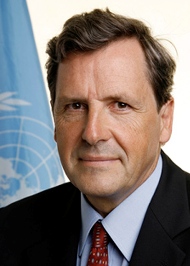UN peacekeeping chief says Darfur mission too slow in helping citizens
December 19, 2008 (NEW YORK) – Under-Secretary-General for Peacekeeping Operations Alain Le Roy told the UN Security Council today that his requests for certain equipment have gone unfilled and the peacekeeping mission in Darfur has been “much too slow in providing real improvements for the ordinary citizens on the ground and inadequate in resolving the Darfur crisis.”

Le Roy regretted that no country has contributed to fulfill UNAMID’s requests for a multi-role logistics unit, a medium-transport unit, a heavy transport unit, an aerial reconnaissance unit, light tactical helicopters and 18 medium-utility helicopters. Pledges for those resources are still outstanding. He reiterated his appeal to Council members to urge troop and police contributing countries in a position to provide those capabilities to do so without further delay.
As the conflict enters its sixth year, millions of Darfurians continue to live in camps for internally displaced persons, dependent on the life-saving assistance of the humanitarian effort, he said.
In the first year of its operation, UNAMID has lost 21 personnel. Le Roy urged troop contributing countries to make greater efforts to accelerate deployment. He also noted that it is important for already deployed UNAMID units to focus on protection of civilians and facilitation of humanitarian assistance.
Le Roy spoke of continuing fighting between rebel forces and the government, with offensive operations carried out by many parties.
The UN official said that it is deeply regrettable that another year has passed while the parties continued to engage in military action rather than investing themselves fully in political negotiations.
According to Under-Secretary-General for Field Support Susana Malcorra, the UNAMID mission could likely reach 60 percent deployment of uniformed personnel by the end of the year, as a result of the accelerated movement of equipment, enhanced engineering capability and improved cooperation with the Government of the Sudan.
Nevertheless, she stated that the gains were being made despite the fact that Darfur remains designated as a “phase four” security zone. The elevated security phase has forced the delay of the deployment of approximately 200 armed UN police officers to Darfur.
Sudanese envoy Abdalmahmood Abdalhaleem Mohamad noted that Sudan had agreed to establish an office with the hybrid mission, headed by a high-level Sudanese official, which wouldwork with government institutions to guarantee the flow and speed of all procedures.
Over 230,000 people fled fighting in Darfur this year, at a rate of around 1,000 per day, according to the UN Secretary General’s October report on Darfur. About 2.7 million people have fled their homes in Darfur and eastern Chad as a result of the conflict, which began in 2003 and elicited the world’s largest humanitarian response.
(ST)
